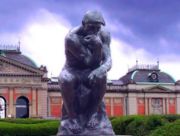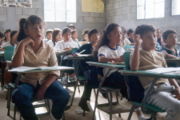Human intelligence
We just haven't been using it as efficiently as we could be. Currently with activities such as design and engineering only relatively small groups of people collaborate in any meaningful way. Research and development — whether of scientific projects, products, services, or modern business processes — is usually done behind closed doors and the results carefully hidden. This leads to reduplication of effort and of skilled cognitive work. As a result, progress is much slower than it could be. Problems such as a cure for cancer concern us all and it is a terrible waste to have multiple groups of scientists working on the problem in isolation from each other, hiding their results so that their company will profit when the solution is found.
Open collaboration is a radically different development landscape, one that allows the entire intelligence of humanity to work together on solutions to the challenges that confront our species. Forces working together intelligently will always be more effective than forces working in isolation, so progress can be far quicker and more efficient.
In a sense, human intelligence is the most important resource of all. Abundant energy, material and information are useless if we can't figure out how to apply them to improve the lives of our fellow men and women. This wiki is full of technological solutions to human challenges; but technology is nothing other than the result of human intelligence. Intelligence is the ultimate resource, because abundant intelligence can think its way out of problems caused by a shortage of other resources.
As well as potentially increasing the effectiveness of our current intelligence, total intelligence is growing constantly:
- Worldwide education is becoming more pervasive and of better quality, meaning that a much larger percentage of the world's population can effectively participate in developing solutions. The bulk of the world's population has, up until now, been in a situation where the sophisticated information gathered by humanity was inaccessible to them. Now, if cheap computers and wireless Internet can be spread to the 85% of humanity living in these countries, we open up a massive goldmine of ideas, invention, and innovation to advance humanity.
- The world population is still expanding which increases the pool of intelligence and the rate of time-binding. In a situation of worldwide collaboration, rather than local competition, the important thing is the total aggregate intelligence of the 'hive mind', not individual intelligence.
- The proposed advanced automation will result in freeing a greater percentage of the population to work on solutions to significant problems if they so wish.
- Nootropic drugs and nutrients that increase intelligence are continually being researched and developed and popularized. These effect the brain, often facilitating the pathways by which it produces its juice, leading to an increase in mental performance measures such as memory, concentration and IQ. There are also plants (such as Bacopa Monnieri, Withania Somnifera and many others) that can increase intelligence, but these tend to be called adaptogens, with the name 'nootropics' being reserved for synthetic and semi-synthetic substances. The current explosion in biotechnology and understanding of the brain's chemistry and functioning are likely to lead to more effective ways of directly increasing human intelligence.
Increment of association
The increment-of-association, a term coined by engineer C.H. Douglas, meaning simply that when we combine our efforts we can do more than the sum of what each of us could do seperately. Five people acting synergetically together can lift a small modern car, but if each of the five tries separately, the car will not budge. As society evolved from tiny bands, to larger tribes, to federations of tribes, to city-states, to nations, to multinational alliances, the increment-of-association increased exponentially. A stone-age hunting band could not build the Parthenon; a Renaissance city-state could not put Neil Armstrong on the Moon. When the increment-of-association increases, through larger social units, doing-more-with-less becomes increasingly possible.
Open collaboration, empowered by digital communication, enables the greatest possible social unit: all mankind. A social unit of billions of people can do things that are otherwise impossible: creating Wikipedia, writing a comprehensive open education syllabus, or compiling the world's medical knowledge into a single computer program.
It is estimated that by 2020, 5 billion people will be connected together on the Internet. Such a coming-together of intelligence is totally unprecedented, and will surely yield solutions to many of our current problems.
Time-binding
As humans collaborate with one another across space, we can also collaborate across time. An engineer building a car nowadays incorporates in his project the cognitive work done by Isaac Newton hundreds of years ago. In this way we can draw on an ever-expanding pool of knowledge.
Alfred Korzybski  called this phenomenon time-binding
called this phenomenon time-binding  . He argues in Manhood of Humanity that humans have the unique ability to compound their knowledge generation after generation. Each generation inherits the knowledge of the previous one, adds its own and passes it on. In this sense, each generation has more sophisticated ideas to operate on than the previous one. Buckminster Fuller had a similar idea, which he simply called "know-how".
. He argues in Manhood of Humanity that humans have the unique ability to compound their knowledge generation after generation. Each generation inherits the knowledge of the previous one, adds its own and passes it on. In this sense, each generation has more sophisticated ideas to operate on than the previous one. Buckminster Fuller had a similar idea, which he simply called "know-how".
Education
Ignorance is a contributing factor in many of the problems we face today, such as AIDS, pollution and food production. A first-rate education for the citizenry synergizes with every other element of an advanced civilization: scientific discovery happens faster, open collaborative projects grow faster and at a better quality, public health improves, solutions to our problems come faster and ambitious projects like colonising space or curing cancer become more and more feasible.
with every other element of an advanced civilization: scientific discovery happens faster, open collaborative projects grow faster and at a better quality, public health improves, solutions to our problems come faster and ambitious projects like colonising space or curing cancer become more and more feasible.
There is no reason whatsoever for education to be a scarce resource. Education is a resource of information, rather than of physical goods, and reproducing information is free. In a world of universal connectivity, education can be ubiquitous if it is made freely available online. This is a task for open collaboration.
It is no secret that the schooling system nowadays is in a crisis. Our schools are based on a factory-line model: a child goes in one end, is processed according to a standard procedure and comes out the other end with a certificate. No regard is paid to the person's interests, curiosity, creativity, passion. Students are taught outdated material from a peculiar selection of often irrelevant or downright boring subjects. Their flexibility and capacity to deal with unexpected, non-obvious solutions are not encouraged, and are often actively suppressed. They are not free to pursue their passions and talents. They are not given the chance to apply their skills in any practical way. And worst of all, most students simply hate school. (One study [2] found that only 10-33% of students report being satisfied with school. The same study found that most students feel their teachers are uninterested in supporting them.)
How can we promote better education? The answer seems simple: make learning truly interesting, more relevant to the individual and make proper use of modern media. An inflexible curriculum only benefits the schools and assessment bodies.
It is becoming ever easier to create interactive 3-D environments such as those found in advanced computer games. With the right scripting for interaction and behaviour, these can make a captivating experience where the student hardly realises they are learning.
It is a crime for education not to be interesting! Luckily, for every module of every subject there are educators (and others) who are truly gifted at explaining and teaching key concepts. We must make better use of these people in conjunction with open collaboration and the latest technology to disseminate knowledge to all who wish to learn, wherever they might be in the world.



